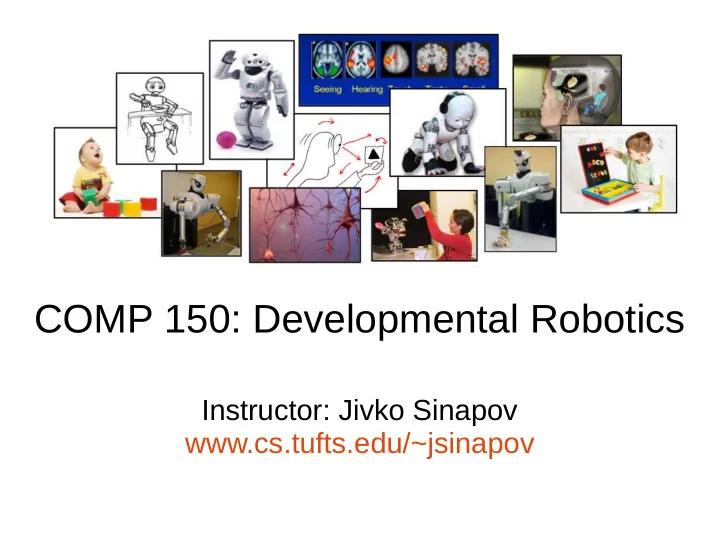

COMP 150: Developmental Robotics Instructor: Jivko Sinapov www.cs.tufts.edu/~jsinapov
This Week ● Embodiment ● Team-up Activity ● Literature Surveys
Announcement ● Readings for Week 4 are out ● Homework 2 will go out on Thursday
Embodiment No body Body
Traditional View of AI Mainstream Science on Intelligence December 13, 1994: An Editorial With 52 Signatories, History, and Bibliography by Linda S. Gottfredson, University of Delaware “Intelligence is a very general mental capability that, among other things, involves the ability to reason, plan, solve problems, think abstractly, comprehend complex ideas, learn quickly and learn from experience .”
Origin of Intelligence in Humans
Leonardo da Vinci [http://www.pc.rhul.ac.uk/staff/j.zanker/teach/ps2080/l4/ps2080_4.htm]
Rene Descartes [http://psych.hanover.edu/classes/neuropsychology/webnotes/Class2.html]
Rene Descartes
Rene Descartes
Rene Descartes
Homunculus “A miniature, fully formed individual believed by adherents of the early biological theory of preformation to be present in the sperm cell.”
Grown-up Homunculus
Homunculus [http://theboundsofcognition.blogspot.com/2010/12/gibsons-rejection-of-retinal-image-1.html]
Avatars
The Matrix
Apps for the brain? [http://www.coolest-gadgets.com/20060402/top-10-best-april-fool%E2%80%99s-gadget-stories-and-hoaxes/]
Embodiment Principle “An important implication of the verification principle is that the robot must have the ability to verify everything that it learns. Because verification cannot be performed in the absence of actions the robot must have some means of affecting the world, i.e., it must have a body.”
Traditional vs Embodied AI ● Abstract intelligence ● Embodiment – knowledge is implicit in the – attempt to simulate fact that we have a body “highest” human ● embodiment is a foundation faculties: for brain development ● language, discursive ● Intelligence develops reason, mathematics, through interaction with abstract problem environment solving ● Environment model – Situated in a specific environment – Condition for problem – Environment is its best solving in abstract way model – “brain in a vat”
Embodied AI Embodied Intelligence (EI) is a mechanism that learns how to survive in a environment (potentially hostile) ● Mechanism: biological, mechanical or virtual agent with embodied sensors and actuators ● EI acts on environment and perceives its actions ● EI learns so it must have associative self-organizing memory ● Knowledge is acquired by EI
Embodied AI Agent Drawing by Ciarán O’Leary- Dublin Institute of Technology
Embodied AI “Embodiment of a mind is a mechanism under the control of the Embodiment intelligence core that contains sensors Intelligence Sensors and actuators connected to the core core through communication channels.” Actuators Environment Environment Drawing and quote by Janusz Starzyk EECS, Ohio University
Embodied AI Agent Architecture Reason Short-term Memory Perceive Act RETRIEVAL LEARNING Long-term Memory INPUT OUTPUT Task Environment Simulation or Real-World System From Randolph M. Jones, P : www.soartech.com
Embodiment in Humans
Embodiment in Humans https://anagnk.files.wordpress.com/2013/03/fetal-growth.jpg
Embodiment in Humans Source: Getty Images
Embodiment in Humans
Embodiment in Humans Human Brain Human Brain 14 Years Old 6 Years Old 14 Years Old 6 Years Old at Birth at Birth Rethinking the Brain, Families and Work Institute, Rima Shore, 1997.
Synaptic Density over Time Thompson, R. A., & Nelson, C. A. (2001). Developmental science and the media: Early brain development. American Psychologist, 56(1), 5-15.
Penfield (a.k.a. Sensory) Homunculus
And its 3D analog
Sensory and Motor Homuculus https://www.ebmconsult.com/content/images/Anatomy/Homonculus%20Sensory%20and%20Motor%20Cortex%20v2.png
Discussion ● Do we really need a body to study AI? ● What are some of the differences in practice between embodied AI and disembodied AI? ● Which one is ``harder’’ to do?
How do robots currently represent their own bodies?
What kind of data structure would you define to represent this: http://nptel.ac.in/courses/112103174/module7/lec5/images/e1.jpg
What about this?
Types of Robot Joints http://nptel.ac.in/courses/112103174/module7/lec5/images/01.png
Robot Bodies in ROS
ROS Tutorial on URDF http://wiki.ros.org/urdf/Tutorials
What are some limitations of this approach to represent bodies?
Team-up Activity
Recommend
More recommend